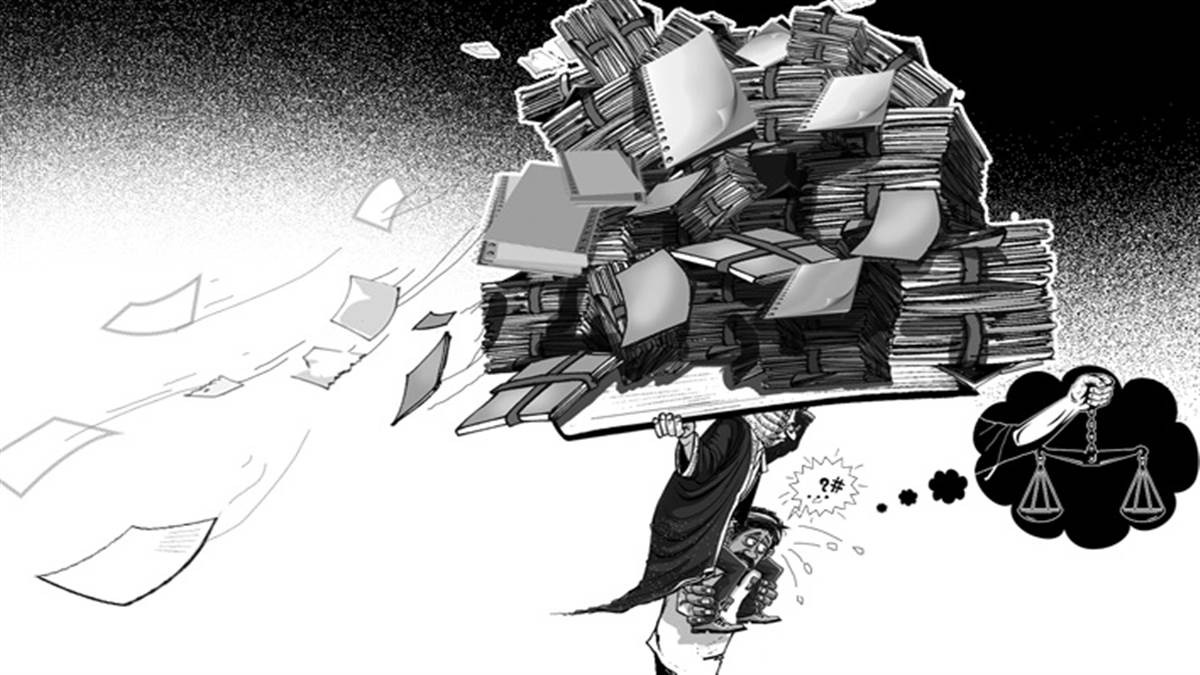On the concluding day of the National Conference of District Courts, President Draupadi Murmu has only served to highlight a serious problem of the judiciary by referring to pending cases and delay in justice. She described pending cases as a big challenge for the judiciary and explained in detail the problems faced by the common man due to such cases, which should be addressed with immediate effect by the executive and the judiciary.
It has become extremely necessary to do so because the number of pending cases is increasing from lower courts to the Supreme Court. According to a statistic, the number of such cases has reached five crore.
It is true that Lok Adalats are active to reduce the burden of pending cases but still the desired results are not being achieved. It is not right that even after so many years of independence, our judicial system has not become like that of developed and many developing countries. Delay in justice is not only increasing social resentment but also adversely affecting development work, because like criminal cases, real estate and corporate cases are also pending in the courts. Another problem is that the central and state governments are the biggest litigants. After all, what can be worse than the governments getting entangled in the courts with their own people?
It is good that Chief Justice DY Chandrachud is also well aware of the problem of delay in justice. He said at the National Conference of District Courts that there are 28 per cent vacancies for judicial staff and 27 per cent for non-judicial staff at the district level. He also mentioned a committee formed to reduce pending cases and an action plan to reduce such cases.
Under this three-phase action plan, measures will be taken to enable the courts to function at their full capacity. This action plan also includes the recruitment of efficient judicial officers and settlement of pending cases. This action plan seems to be working, but it will only matter if it is implemented properly and yields favourable results in time.
When Prime Minister Modi took charge of the government in 2014, he promised to abolish old laws. In keeping with this promise, all old and irrelevant laws have been abolished, but the burden of pending cases and the problem of delay in justice are not being solved. The process of lower courts in our country is worrisome. This process makes a mockery of the judiciary.' Lower courts are struggling with a shortage of judges as well as lack of funds and due to this also people are not able to get justice on time. One reason for the delay in justice is also the way judges and lawyers work.
Similarly, the dates after dates are discouraging the common man. In this regard, the President rightly said that now the common man is afraid to approach the courts. The name he gave to this fear, Black Coat Syndrome, is absolutely correct. Justice delayed is injustice.
Sometimes it seems that justice is going out of the reach of the common man. The poorer and more helpless a person is in his own country, the more difficult it is to get justice. It would be better for our policy makers to keep in mind that if people lose faith in the judiciary, it will not be good for democracy. Of course, it is not that the decision is delayed only in normal cases. Even in serious cases, justice is not delivered on time. For example, it is also important that cases of corruption of politicians and bureaucrats should be heard on a priority basis.
There is some more delay now.
Taking advantage of this, supporters of leaders facing corruption cases or sent to jail create an atmosphere that they have been implicated in false cases as part of revenge politics. Whenever leaders facing corruption charges get bail, such leaders and their supporters start propagating that they have got a clean chit, while the reality is something else.
A similar situation is being created after the bail of those arrested in the Delhi excise scam. These people got bail because there was a delay in starting their trial. The second reason is that the investigating agencies are not able to put sufficient evidence before the courts. If the investigating agencies are not able to do their job properly, then political corruption cannot be attacked. Just like political extortion, there is also a delay in hearing cases of crimes against women and especially sexual crimes. Sometimes there is a delay even in some cases which are serious and have caught the attention of the whole country. It is true that it took eight years to hang the culprits of the much talked about Nirbhaya case of Delhi. Similarly, the final verdict has not yet come in a very famous case of Unnao. When there is a delay in getting justice in cases of such heinous crimes or the accused are acquitted due to faulty investigation and witnesses turning hostile, then the common people start losing faith in the justice system.
It is important that such steps be taken to end the unnecessary delay in justice so that people's faith in the justice system remains intact, but the opposite happened. It is often seen that people from the executive, legislature and judiciary keep mentioning the reasons for the delay in justice, but are unable to form a consensus on how to solve these reasons.
They will not only have to form a consensus but also jointly create a system that can effectively solve the problem of delay in justice. If this is not possible, it will not only be difficult to stop corruption and crime, but it will also be difficult to increase the pace of development of the country and turn the dream of a developed India into reality.
 look news india
look news india
